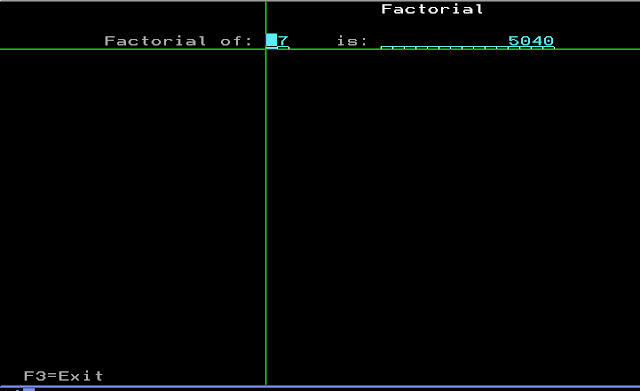(IBM i fans only) Recursion in RPGfree

To my friend.
I want to dedicate this short post to a dear friend of mine, a developer who uses the C language and other modern programming tools, who repeatedly asked me: "Is the RPG language recursive?".
Until some time ago I had to answer: "unfortunately not". I defended myself by explaining that the RPG language is a programming language primarily used for developing business applications for the IBM i and there is no need for advanced features.
Bullshit! Actually the RPG language was not recursive, STOP!
But now, finally and with great satisfaction, I can answer yes, it is!
What does "Recursion" mean?
Recursion is a programming technique or approach where a function or a subroutine calls itself directly or indirectly to solve a problem. It involves breaking down a complex problem into simpler subproblems that can be solved easily, and then using the same function to solve those subproblems repeatedly until the base case is reached.
Recursion can be a powerful tool in programming because it allows you to write more elegant and concise code that is often easier to understand and maintain. However, recursion should be used with caution, as it can lead to stack overflow errors if not implemented properly.
Practical example:
Look my dearest friend, this is the source code for Display File:
RECU00V.DSPF
DSPSIZ(*DS3)
CHGINPDFT(UL CS)
PRINT
CF03(03)
CF05(05)
CF06(06)
*******************************************************
* F01
*******************************************************
R F01
OVERLAY
1 34'Factorial'
DSPATR(HI)
3 10'Factorial of:'
PPFNUM 2Y 0B +1EDTWRD('0 ')
+4'is:'
PPRESU 15Y 0B +1EDTCDE(Z)
F1ERR1 78A O 22 2COLOR(RED)
F1ERR2 78A O 23 2COLOR(RED)
*******************************************************
* P00
*******************************************************
R P00
24 3'F3=Exit'
60 +3'F6=Calculate'
this is the source code for RPG program:
RECU00.RPGLE
**free
// *************************************
// Recursion in RPG *
// *************************************
ctl-opt dftactgrp(*no);
dcl-f RECU00V workstn;//indds(Dspf);
// *********************************
// start working *
// *********************************
dow (1 = 1) ;
write p00;
exfmt f01;
if (*in03);
leave;
endif;
select;
when PPFNUM = 0; // defined as 1 by
PPRESU = 1; // mathematical convention.
when PPFNUM > 16;
PPRESU = *zero;
F1ERR1 = 'Too big. I calculate since 16';
when PPFNUM >0 and PPFNUM <= 16;
F1ERR1 = *blanks;
PPRESU = factorial(PPFNUM);
other;
endsl;
enddo;
*inlr = *on;
// **********************************
dcl-proc factorial; // *
// **********************************
dcl-pi *n zoned(15);
Parm1 zoned(15) const;
end-pi;
if Parm1 = 1;
return 1;
else;
return Parm1 * (factorial(Parm1 - 1));
endif;
end-proc;
That's it!
I appreciate all the comments made on this blog.
I appreciate all the comments made on this blog.





This is not new. This has been around for the last 13 years since 7.1 came out.
ReplyDeleteI know. My friend is an old friend. I just wanted to tell a story ;-)
DeleteActually recursion came into RPG IV almost from the beginning WAY before 7.1. It was first available with V3R2/6 some 27+ years ago!
DeleteIt is even possible at program level, if you create the program with activation group *new. Of course that is pretty much expensive though possible.
ReplyDeleteFirst time I wrote recursive programming 10 years ago in V7R1.
ReplyDeletequel dow 1=1 grida vendetta :-)
ReplyDelete;-)
DeleteChiaro Aldo. Thank you for interesting example. Just one thing to verify: in your description you did not mention if any special keys should be specified on program creation. Should they ? Does ACTGRP = *NEW is mandatory for this example ?
ReplyDeleteHi El1ka.
DeleteNo, there are no special keys that need to be specified when creating the program. The code provided should work as is without any additional keys or parameters during compilation.
Feel free to experiment with the code and let me know if you have any more questions or if there are other topics you'd like to explore.